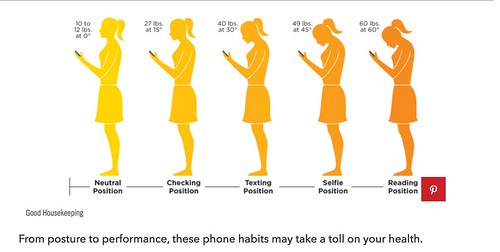How Smart Phones Make Us Dumb
Smart phones can stifle accurate thinking, emotional growth and their use can be addictive and dangerous to our health.
Image from the Good Housekeeping article “Smartphone health problems (1) shows how smart phones can add weight on the spinal column as we alter our posture.”
Recently a friend and chiropractor explained to me that a number of new diseases have been created by overuse of smart phones. Some problems result from the added weight on the spinal column created by continually reading a smart phone.
Another is called “Nomophobia” or “no-mobile-phone phobia”. For example, a study suggests that over half of the U.K., population fears losing or being without their phones at any given time. Problems with repetitive use on the elbows and fingers have also grown.
A Wall Street Journal article “Take back your brain from social media (2)” examines how we can use the smart phone to become addicted to information feedback that makes us dumb.
The article says: “Mindlessly checking Facebook makes you an awful lot like a lab rat. When you check your phone, your brain gets its own little zing. Are Facebook or Twitter “addictions”? Though the emerging scientific research on social media doesn’t agree on that term, the evidence that we aren’t coping well is on display at dinner tables where everyone is staring at screens—and even at crosswalks, where distracted pedestrians walk into traffic. Don’t just blame the millennials. A new Nielsen study found Americans age 35 to 49 spend nearly seven hours a week on social media, more than younger generations.
A large part of the population wakes up every day with their iPhones next to the bed. The first thing they see are the headlines. All day they are fed data on social media like Twitter and Facebook. These feeds are structured by algorithms to send only the interests and likes of each unique reader. They only get the viewpoints they’re expecting. There is a danger at a personal as well as national level when the news only shows us what we want to hear and see.
When the news only reinforces our beliefs, this creates mental and emotional inflexibility and deters any evolution in our thinking. And stunts even stops our growth.
I resolved this problem by getting rid of my iPhone. I still have a flip top but I only use it as a telephone when away from home. I seem to stay in touch with the world just fine. I know a growing number of readers won’t take that option so here are some more tips on how to create “smart phone information temperance”.
Here are three tips that can help stop smart phone addiction.
#1: Limit the Triggers. It’s easier to control bad habits if we simply don’t get started. This is why I do not keep chocolate ice cream in our fridge! Our brains are wired to voraciously feed on information so turn off any app notifications on your phone and computer. Regain control by setting limits on when you will and won’t tune in.
#2: Separate Work and Play. Don’t install Facebook or any social media app on your work devices. Set times of the day when you will not look at social media.
#3: Stop algorithm click through expansion. When you’re on Twitter or Facebook, it’s easy to read one article, then another, then another. I do not use Twitter or Facebook, but do read the news online. I limit my clicking on additional algorithm driven articles while reading an article to one click, one time a day. Everyone should set their own limit but the more you decide what information to use, instead of the algorithms, the more control over your thinking and freedom of thought you’ll have.
Realize that addiction is a chronic brain disorder, not simply a behavior problem. Addiction is commonly associated with substance abuse, but behavioral addictions like gambling can be just as serious.
Though social media is still a socially accepted behavior, evidence is stacking up that it can be so habit forming that it is an addiction. When a person is unable to consistently abstain from a behavior or substance, it is an addiction and there is usually a cost of mental and physical health.
Our report “Live Anywhere – Earn Everywhere” investigates how our freedom is increasingly at the risk due to the Bayer-Monsanto merger and the way these firms will use social media in conjunction with AT&T.
Bayer and Monsanto have a working relationship with AT&T. AT&T has been creating a web of information control. They have been taking control over internet portals, our phones, our TV system and content production plus they are working with social media gaming companies. They control almost every aspect of everything that some of their customers see, hear, read and write. The social gaming company can even use the addicting elements of social media to influence our thought… a lot.
Don’t let businesses that have their own agenda control yours. Break the social media habit. Control the destiny of your thought.
Gary
(1) Goodhousekeeping.com: Smartphone health problems
(2) Wall Street Journal: Take back your brain from social media
Read more: http://www.garyascott.com/2017/02/25/50603.html#ixzz4ZnxK5GPL
For your personal copy of my newsletter please visit www.garyascott.com
Under Creative Commons License: Attribution

No comments:
Post a Comment
Thanks for commenting. Your comments are needed for helping to improve the discussion.